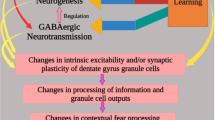Abstract.
Rationale: It has been suggested that tachykinin NK2 receptor antagonists may have therapeutic utility in anxiety and/or depressive disorders. Objective: The present study investigated the modulatory action of the NK2 receptor antagonist SR48968 on emotional processes in rodents. Methods: The tests used include classical models of anxiety (punished lever pressing and punished drinking conflict tests, elevated plus-maze in rats), a model based on defensive behaviors of mice confronted with a natural threat (a rat), and two tests based on exposure of rats or mice to a natural predator (a cat) followed by subsequent exposure to a cat odor cue. The prototypical anxiolytic diazepam was used throughout as a positive control, the antidepressant imipramine was tested in the mouse defense test battery and in both models of predatory exposure, and the selective CRF1 receptor antagonist antalarmin was used in the cat-exposure test in rats. Results: Unlike diazepam, SR48968 failed to increase rates of responding suppressed by punishment in both conflict procedures. By contrast, in the elevated plus-maze test, the NK2 receptor antagonist (3 mg/kg, IP) elicited positive effects on traditional and ethologically derived measures of anxiety. In the mouse defense test battery, SR48968 (0.03–1 mg/kg, IP) decreased flight reactions, risk assessment behavior, defensive biting and escape attempts. While the magnitude of the effects on flight, risk assessment and escape attempts of the NK2 receptor antagonist was less than that of diazepam, SR48968 appeared to be as effective as the BZ on defensive biting. In rats previously exposed to a cat, SR48968 (3 mg/kg, IP), antalarmin (1 mg/kg, IP), imipramine (30 mg/kg, IP), but not diazepam, reduced subsequent high levels of avoidance responses when subjects are exposed to a cat odor-saturated cue 1 h later. Similar effects of SR48968 (0.1–0.3 mg/kg, IP) were observed in mice following repeated administration (twice a day/5 days/IP). Importantly, the positive effects of the NK2 receptor antagonist were evident at doses that did not impair general activity, unlike imipramine which displayed mainly sedative action. Moreover, the (R)-enantiomer of SR48968, SR48965, which was tested in the elevated plus-maze, the mouse defense test battery and the cat exposure tests, was much less active than its racemate, indicating a stereoselective action of SR48968. Conclusion: These data show that while SR48968 has limited or no efficacy in models or behavioral measures mainly sensitive to BZs, it shows good activity in reducing anxiety-like behaviors following traumatic stress or upon forced and unavoidable contact with a threatening stimulus. This suggests that NK2 receptor antagonists may have a potential in the treatment of some forms of anxiety disorders.
Similar content being viewed by others
Author information
Authors and Affiliations
Additional information
Electronic Publication
Rights and permissions
About this article
Cite this article
Griebel, G., Perrault, G. & Soubrié, P. Effects of SR48968, a selective non-peptide NK2 receptor antagonist on emotional processes in rodents. Psychopharmacology 158, 241–251 (2001). https://doi.org/10.1007/s002130100830
Received:
Accepted:
Issue Date:
DOI: https://doi.org/10.1007/s002130100830




